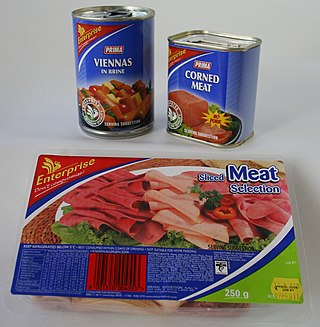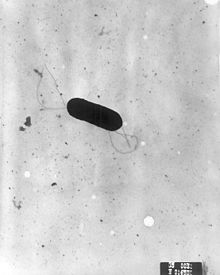
Listeria monocytogenes is the species of pathogenic bacteria that causes the infection listeriosis. It is a facultative anaerobic bacterium, capable of surviving in the presence or absence of oxygen. It can grow and reproduce inside the host's cells and is one of the most virulent foodborne pathogens. Twenty to thirty percent of foodborne listeriosis infections in high-risk individuals may be fatal. In the European Union, listeriosis continues an upward trend that began in 2008, causing 2,161 confirmed cases and 210 reported deaths in 2014, 16% more than in 2013. In the EU, listeriosis mortality rates also are higher than those of other foodborne pathogens. Responsible for an estimated 1,600 illnesses and 260 deaths in the United States annually, listeriosis ranks third in total number of deaths among foodborne bacterial pathogens, with fatality rates exceeding even Salmonella spp. and Clostridium botulinum.

Lunch meats—also known as cold cuts, luncheon meats, cooked meats, sliced meats, cold meats, sandwich meats, delicatessens, and deli meats—are precooked or cured meats that are sliced and served cold or hot. They are typically served in sandwiches or on a tray. They can be purchased pre-sliced, usually in vacuum packs, or they can be sliced to order.

Listeria is a genus of bacteria that acts as an intracellular parasite in mammals. By 2024, 28 species had been identified. The genus is named in honour of the British pioneer of sterile surgery Joseph Lister. Listeria species are Gram-positive, rod-shaped, and facultatively anaerobic, and do not produce endospores.

Listeriosis is a bacterial infection most commonly caused by Listeria monocytogenes, although L. ivanovii and L. grayi have been reported in certain cases. Listeriosis can cause severe illness, including severe sepsis, meningitis, or encephalitis, sometimes resulting in lifelong harm and even death. Those at risk of severe illness are the elderly, fetuses, newborns and those who are immunocompromised. In pregnant women it may cause stillbirth or spontaneous abortion, and preterm birth is common. Listeriosis may cause mild, self-limiting gastroenteritis and fever in anyone.

Maple Leaf Foods Inc. is a Canadian multinational consumer-packaged meats and food production company. Its head office is in Mississauga, Ontario.

The Listeriaceae are a family of Gram-positive bacteria that includes two genera: Listeria and Brochothrix. They are short, rod-shaped bacteria that are aerobic or facultatively anaerobic. Spores are not formed, but under stress these bacteria can form filaments. Some species, namely Listeria monocytogenes, can cause human and animal listeriosis. While not all bacteria in the Listeriaceae family are considered a danger to humans, some are strongly associated with food borne illness or microbial spoilage, so they remain a topic of interest in agricultural industries.

Listeriosis is an infectious but not contagious disease caused by the bacterium Listeria monocytogenes, far more common in domestic animals, especially ruminants, than in human beings. It can also occur in feral animals—among others, game animals—as well as in poultry and other birds.

The 2008 Canadian listeriosis outbreak was a widespread outbreak of listeriosis in Canada linked to cold cuts from a Maple Leaf Foods plant in Toronto, Ontario. There were 57 total confirmed cases, resulting in 23 deaths.

Bologna sausage, informally baloney, is a sausage derived from the Italian mortadella, a similar-looking, finely ground pork sausage, named after the city of Bologna. Typical seasonings for bologna include black pepper, nutmeg, allspice, celery seed and coriander, and, like mortadella, myrtle berries give it its distinctive flavor.
Euro College (Kumanovo) is an accredited private college in North Macedonia. Degree programs take 2/3 years and the graduates are awarded with a Bachelor or master's degree in Business Administration after completing 180 ECTS/120 ECTS.

A health crisis is an emergency situation or complex health system that affects the public in one or more geographic areas from a particular locality to encompass the entire planet. Health crises generally have significant impacts on community health, loss of life, and on the economy. They may result from disease, industrial processes or poor policy.

The 2011 United States listeriosis outbreak was a widespread outbreak of Listeria monocytogenes food poisoning across 28 US states that resulted from contaminated cantaloupes linked to Jensen Farms of Holly, Colorado. As of the final report on August 27, 2012, there were 33 deaths and 147 total confirmed cases since the beginning of the first recorded case on July 31, 2011. It was the worst foodborne illness outbreak in the United States, measured by the number of deaths, since the Centers for Disease Control and Prevention began tracking outbreaks in the 1970s, or tied with the worst, an outbreak of listeria from cheese in 1985, depending on which CDC report is used.
Listeria virus P100 is a virus of the family Herelleviridae, genus Pecentumvirus.

The 2017–2018 South African listeriosis outbreak, also known as Listeriosis Histeriosis, was a widespread outbreak of Listeria monocytogenes food poisoning that resulted from contaminated processed meats produced by Enterprise Foods, a subsidiary of Tiger Brands, in Polokwane. There were 1,060 confirmed cases of listeriosis during the outbreak, and about 216 deaths. It is the world's deadliest listeriosis outbreak.

The 2018 Australian rockmelon listeriosis outbreak was an outbreak of Listeriosis, caused by the bacteria Listeria monocytogenes, later traced to rockmelon grown by Rombola Family Farms in the Riverina region of New South Wales, Australia.

Milk borne diseases are any diseases caused by consumption of milk or dairy products infected or contaminated by pathogens. Milk borne diseases are one of the recurrent foodborne illnesses—between 1993 and 2012 over 120 outbreaks related to raw milk were recorded in the US with approximately 1,900 illnesses and 140 hospitalisations. With rich nutrients essential for growth and development such as proteins, lipids, carbohydrates, and vitamins in milk, pathogenic microorganisms are well nourished and are capable of rapid cell division and extensive population growth in this favourable environment. Common pathogens include bacteria, viruses, fungi, and parasites and among them, bacterial infection is the leading cause of milk borne diseases.
The 2008–2009 Chilelisteriosis outbreak was an epidemic outbreak of listeriosis in that country, caused by the species Listeria monocytogenes, which spread mainly through foods of animal origin, such as cecina, sausages, cheese and other dairy products. As of August 2009, 164 cases had been recorded, with a total of 16 deaths, among whom different strains of the bacterium were detected.
The 2024 United States listeriosis outbreak is an incident in the United States in which 28 people have fallen ill and two have died from listeriosis.











